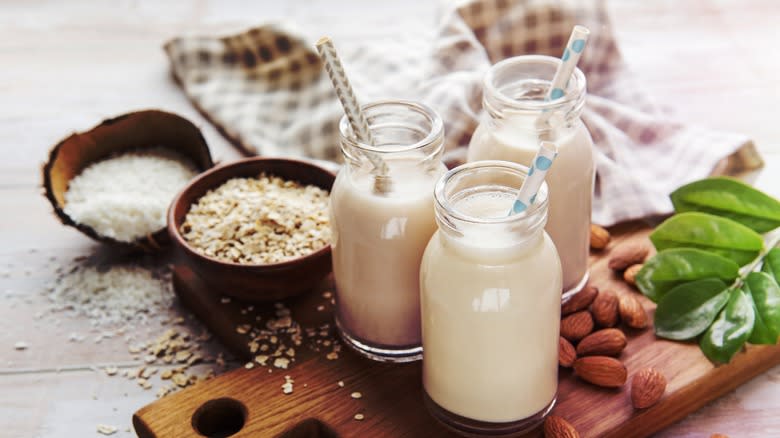For Richer Oats, Cook Them In Milk Instead Of Water

Let's play a guessing game. You can pop them in the microwave, bake them into cookies, or transform them into milk or coffee creamer. If you guessed oats, you're right on the money! The prize? A kitchen hack that will take your oatmeal game to new luscious new heights. Instead of cooking your stovetop oats with water, use milk instead.
Substituting milk for water in a classic stovetop oatmeal recipe is an easy way to give the dish a thicker and richer quality for a more robust mouthfeel. Cooking oats in milk provides them with a delicate creaminess and gives them a subtle, nuanced sweetness distinct from the milk flavor. Although milk has a flavor of its own, it's a common and familiar kitchen staple that serves as a versatile base for a wide range of recipes. So, whether you like them made savory or sweet, milk won't disturb the tapestry of flavors you cook into your oats.
Read more: The 15 Best Milk Brands, Ranked
Milk Variations

Although we often talk about milk as a solitary ingredient, there are several types to consider cooking your oats in. The many variations of milk all boast distinct qualities, so take some time to figure out what works best for your favorite oatmeal recipe.
Dairy milk alone has many different varieties to choose from, but for the sake of keeping it simple, we'll focus on some of the common types of dairy milk: whole milk, low-fat milk, and skim milk. Whole milk, with its high-fat content, imparts a luxurious creaminess to the oats that culminates in a deeply rich and hearty bounty. On the other hand, low-fat milk is a lighter option that still contributes a pleasant level of creaminess to the oats, while skim milk, being the leanest choice, provides an even lighter texture and flavor.
Vegans rejoice -- you too can cook your oats in milk made from plants. Like dairy milk, there are a handful of options for vegan milk to choose from. Almond milk provides oats with a nutty flavor and light and refreshing essence. Coconut milk introduces a tropical essence and a creamy consistency. Oat milk is another creamy option that blends seamlessly with the flavor of oats. Finally, soy milk is a neutral option that allows the other ingredients in your outs to stand out. Ultimately, there is no right answer, so experiment until you discover what best suits your tastes.
Complementary Ingredients

Once you've cooked your oats in the milk of your choosing, you might want some additional ingredients to complement the dish. Fresh berries like strawberries, blueberries, or raspberries introduce a burst of naturally sweet tartness and a vibrant, fruity contrast to the rich, milky oats. Chopped almonds, walnuts, or pecans give the oats a nutritional boost and satisfying crunch that balances the velvety quality of the milk. Bring a hint of warmth and pizzazz to mild-flavored milky oats by sprinkling them with cinnamon, nutmeg, and a generous drizzle of maple syrup.
If you're a fan of savory oats, try incorporating ingredients like sautéed mushrooms, spinach, and a sprinkle of grated Parmesan cheese for an umami-blasted, dairy-kissed batch of oatmeal. Savory oats can also benefit from a poached or fried egg on top, bolstering the richness of the dish while adding extra protein. Whichever way you choose to dress up your oats, branch out and cook them down in milk instead of water. Trust us, you won't regret it.
Read the original article on Daily Meal.
